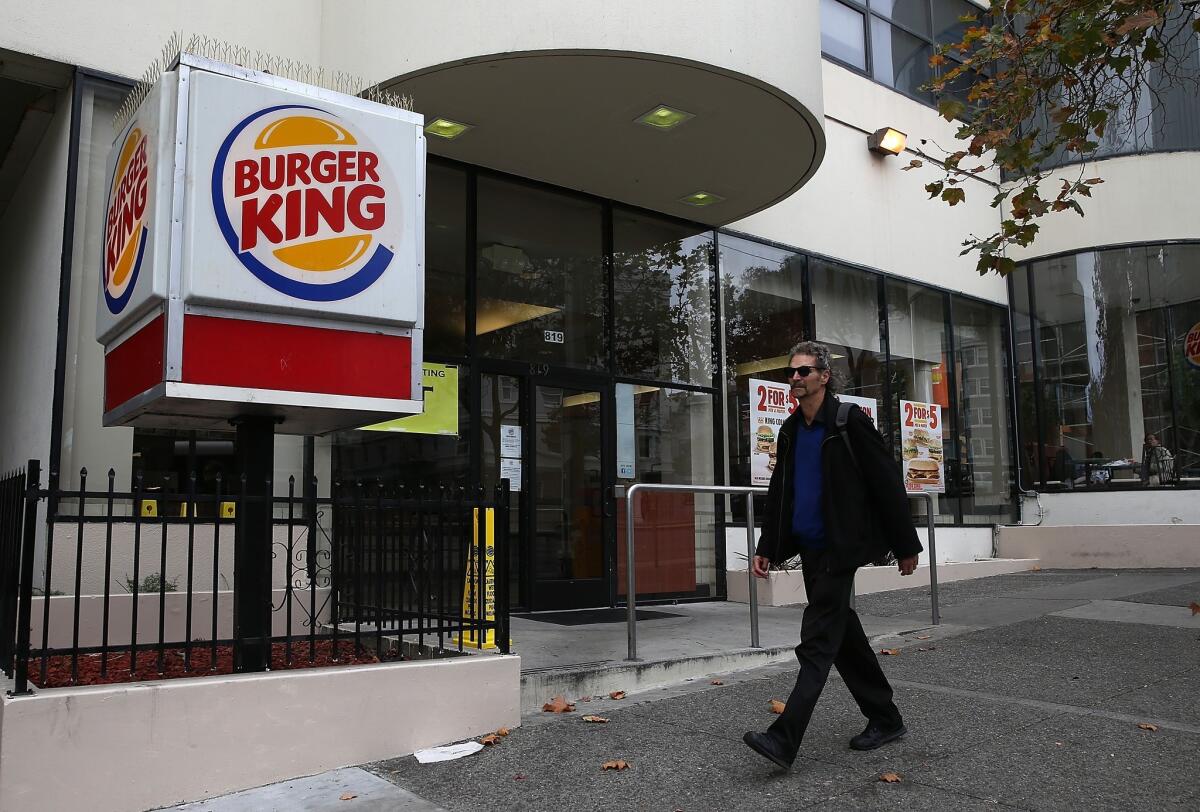Burger King,Tim Hortons talks could turn up heat on tax inversions

Reporting from Washington — Burger King Worldwide Inc.’s potential acquisition of coffee-and-doughnut chain Tim Hortons Inc. could flame-broil the already simmering debate in Washington about new limits on off-shore tax shifting after the companies confirmed a new merged firm would be based in Canada.
A deal between the two fast-food giants would be one of the largest and highest-profile so-called tax inversions, in which a U.S. company buys a smaller foreign firm and moves its headquarters abroad to get lower taxes.
A foreign-based company does not have to pay U.S. taxes on its earnings in the rest of the world and also can use some internal maneuvers to further lower how much it pays to Washington each year.
A surge in inversions has led to a push by the Obama administration and some Democrats in Congress to place new limits on the maneuver.
So far, the deals have been focused in the pharmaceutical industry. A possible deal involving a well-known consumer brand like Burger King could add to the pressure on Congress to act to place new limits on tax-shifting deals.
Burger King is based in Miami and its earnings are subject to the 35% federal corporate tax rate in the U.S., the highest among developed nations. Tim Hortons is based in Ontario, Canada, where the federal corporate tax rate is 15%.
Like many countries, Canada has lowered its rate in recent years to be more business-friendly.
The rate was 22.1% in 2006, when the Canadian government began a gradual reduction that ended in 2012 with the lowest corporate rate of any of the so-called Group of Seven advanced Western economies.
Combined with local and state taxes, Canada’s corporate tax rate is 26.3%, according to the Organization for Economic Cooperation and Development. The combined U.S. corporate rate is 39.1%.
Many U.S. companies use various tax maneuvers, including sheltering some foreign earnings abroad, to pay less than the full rate. Burger King’s overall effective tax rate in 2013 was 27.5%, according to its annual report.
In a statement Sunday, the two companies said they were in merger discussions and that a “new publicly-listed company would be headquartered in Canada, the largest market of the combined company.”
Burger King has more than 13,000 locations in 98 countries. Tim Hortons has 4,546 restaurants, with 3,630 in Canada. It has 866 U.S. locations.
The pace of inversions has picked up significantly in recent years.
Last month, Illinois drug maker AbbVie Inc. announced one when it agreed to buy European rival Shire and locate the new company on the British island of Jersey, a well-known tax haven that has a 0% standard corporate tax rate.
The deal, one of the largest inversions so far, sparked outrage among some lawmakers.
In his fiscal 2015 budget, President Obama proposed toughening the rules on inversions by requiring a company to have at least 50% foreign ownership instead of the current 20% in order to be considered foreign for U.S. tax purposes.
In July, Treasury Secretary Jacob J. Lew wrote to congressional tax writers and urged them to act quickly to limit inversions. He called on U.S. companies to have a sense of “economic patriotism” and not try to avoid paying their fair share of taxes.
House and Senate bills have been introduced based on Obama’s proposal. A House bill, sponsored by Rep. Sander M. Levin (D-Mich.), would generate an additional $19.5 billion in tax revenue over the next 10 years by making inversions more difficult.
Democrats and Republicans would prefer to address inversions as part of a broader overhaul of the U.S. tax system.
But with tax reform stalled, Democrats are looking for stand-alone legislation. The Obama administration also is considering whether it can take any executive actions to limit inversions.
Some key Republicans still want to deal with inversions as part of broader corporate tax reform and argue the high U.S. rate is pushing companies to look to offshore deals to lower their tax bills.
Public pressure could build on Burger King to keep its headquarters in the U.S. the way it did on Walgreen Co.. The nation’s largest drugstore chain said this month it would keep its headquarters in Illinois after completing the purchase of Swiss pharmacy retailer Alliance Boots.
Reports that Walgreen was considering shifting its headquarters to Switzerland, which has an 8.5% corporate tax rate, led to sharp criticism.
Referring to the company’s advertising slogan, Sen. Richard Durbin (D-Ill.) wrote a public letter to Walgreen Chief Executive Gregory D. Wasson last month asking, “Is ‘the corner of happy and healthy’ somewhere in the Swiss Alps?”
In deciding against moving its headquarters, Wasson told the Chicago Tribune that such a move wasn’t in the best long-term interest of the company’s shareholders.
For breaking economic news, follow @JimPuzzanghera on Twitter
More to Read
Inside the business of entertainment
The Wide Shot brings you news, analysis and insights on everything from streaming wars to production — and what it all means for the future.
You may occasionally receive promotional content from the Los Angeles Times.











